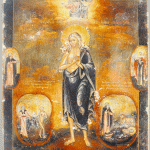
During the Great Fast, we are reminded of our needs. We need food and drink. We need each other’s help. We need grace. More importantly, without God, we are nothing. Without the gifts of God, gifts which help sustain us, we are also nothing. The more we think we are something special, the more we forget how dependent we are on others, the more we forget how dependent we are upon God, the less we will open ourselves to receive what we need. Fasting helps us realize how long we can go before we need to reach out and receive from outside ourselves. Likewise, throughout the fast, we learn not only about our dependence upon others, but also how we can make do with what we have been given, how even a little food, a little grace, can sustain us if we are not careless with it.
Thus, throughout the Great Fast, we are reminded that we need to be humble. We must not lord it over others. We must not think of ourselves as being like a god worthy of judging others and their sins. Humility keeps us from Satanic pride, pride which will make us try to rise up before falling down deep into sin.
Such humility is lost if we look out into the world, not to love it, but to condemn it. St. John Climacus warns us: ”Do not condemn. Not even if your very eyes are seeing something, for they may be deceived.” [1] If we desire to find something to condemn, we will find it, whether or not it justly deserves criticism. But, it is important to realize, such an attitude comes not out of love, not out of a desire to truly make things better, but rather, to make ourselves look better than everyone else. But in the end, we are only fooling ourselves. We will ignore our own spiritual needs. As we become distracted by our judgmental attitude, we will forget to examine ourselves and so avoid our own reformation:
Those who pass speedy and harsh judgments on the sins of their neighbors fall into this passion because they themselves have so far failed to achieve a complete and unceasing memory of and concern for their own sins. Anyone untrammeled by self-love and able to see his own faults for what they are would worry about no one else in this life. [2]
If we are humble and just, we will look to the world with eyes of love and mercy. We will follow the example of Jesus who came into the world, not to condemn it, but to save it. He came to make things better, knowing that this was to be done by lifting up the good where it is found instead of focusing on the bad and using that to condemn all that he saw. We, likewise, should avoid being judgmental and instead seek to show mercy and grace to others. For this is how love acts, and it is through such love that the grace of God will be spread. Where there is love and compassion, there will be healing, but where there is judgment and condemnation, there the grace of God is thwarted and the one who thwarts the grace of God will find that they, and not the ones they condemn, risk the fire to come:
Fire and water do not mix, neither can you mix judgment of others with the desire to repent. If a man commits a sin before you at the very moment of his death, pass no judgment, because the judgment of God his hidden from men. It has happened that men have sinned greatly in the open but have done greater deeds in secret, so that those who would disparage them have been fooled, with smoke instead of sunlight in their eyes. So listen to me, all you accountants of other people’s faults, listen well; for if, as is certain, it is true that “you shall be judged with the judgment you have used yourselves” (Matt. 7:2), then whatever sin of body or spirit that we scribe to our neighbor we will surely fall into ourselves.[3]
While many think the admonition to not judge others is only about judging their eternal fate, in reality, it was about not having a judgmental attitude. Once we presume ourselves capable of judging others, we lose the humility which we need for our own salvation. We should be focused on our own faults, not the faults of others. We should expose the darkness within ourselves, ridding ourselves of those passions which turn us away from love and all its expectations:
Take no part in the unfruitful works of darkness, but instead expose them. For it is a shame even to speak of the things that they do in secret; but when anything is exposed by the light it becomes visible, for anything that becomes visible is light. Therefore it is said, “Awake, O sleeper, and arise from the dead, and Christ shall give you light.” Look carefully then how you walk, not as unwise men but as wise, making the most of the time, because the days are evil. Therefore do not be foolish, but understand what the will of the Lord is (Eph. 5:11-17 RSV).
It is a work of darkness to look into the world with eyes of hate, seeking to judge and condemn it. It is a work of darkness to grasp after ourselves, to rise up with ungodly pride, becoming haughty as we condemn all around us for not fulfilling our desires and expectations of them. It is a work of darkness to break apart humanity with hate instead of to bring it together as one through bonds of love. For, the more we try to prop ourselves up as a god in the world, judging others through our pride, the more we hide from others, and ourselves, our true spiritual state; but, as pride comes before a fall, so with the pride, we will find ourselves slowly crumbling apart from within, until at last, all the darkness will be revealed for all to see. Hate will expose itself. It always does.
[1] St John Climacus, The Ladder of Divine Ascent. Trans. Colm Luibheid and Normal Russell (New York: Paulist Press, 1982), 157.
[2] St John Climacus, The Ladder of Divine Ascent, 156.
[3] St John Climacus, The Ladder of Divine Ascent, 156.
Stay in touch! Like A Little Bit of Nothing on Facebook.
If you liked what you read, please consider sharing it with your friends and family!













